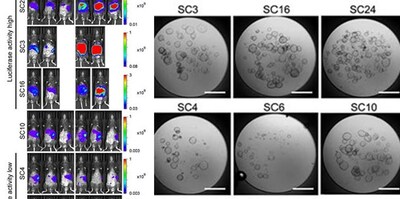KANAZAWA, Japan, Jan. 17, 2023 /PRNewswire/ — In a study recently published in Cancer Science, researchers from Kanazawa University show how some intestinal cancer cells lose their ability to spread as they divide and can be eliminated as the cancer grows.
Cancer cells have developed multiple mechanisms to thrive. One example, derived from age-old theories of evolution, is positive selection i.e., the propensity of cells with favorable cancer mutations to flourish. However, the role of negative selection—the process of foregoing cells with disadvantageous mutations—has not been clearly linked with cancer. Now, a team led by Masanobu Oshima at Kanazawa University has revealed the potential involvement of negative selection in intestinal tumors.
The team started its research by isolating and propagating cells from the intestinal tumors of mice. Upon transplanting into the spleens of mice the ability of these cells to migrate, or metastasize, into the livers was observed. It was seen that 2 weeks after the procedure 30% of the transplanted cells did not migrate into the liver at all. However, genetic profiling of the migratory and nonmigratory cells revealed that both types had, in fact, all cancer mutations from the original tumor intact. The loss of metastatic potential in some cells was hence not attributed to the loss of cancer mutations.
All types of propagated cells were then grown on gel-based matrices (which mimic the internal tissue milieu). However, the nonmetastatic cells displayed reduced growth and survival rates. Thus, it was probable that these unfavorable cancer cells were on track for elimination due to negative selection. To subsequently check for tumor-inducing properties, all cell types were implanted into healthy mice. Indeed, nonmetastatic cells did not generate tumors either.
Now, the researchers have discovered previously that nonmetastatic cells often migrate along with metastatic ones. However, when the cells were transplanted together the nonmetastatic cells only partially migrated. To understand the probable cause of their reduction in metastasis, genetic sequencing was conducted which revealed that the genetic profiles of metastatic versus nonmetastatic cells were considerably different. In fact, nonmetastatic cells displayed the most pronounced reductions in genes which exhibit features of stem cells (which can grow indefinitely).
Finally, the pattern of metastasis of all cell types was assessed after the cells were propagated over multiple rounds. While the nonmetastatic cells retained a complete loss of metastasis down the line, some of the metastatic cells also eventually developed a reduction in this ability, coupled with the inhibition of stem cell–like genes.
This study establishes that certain cancer cells lose their migratory properties and are, thus, eliminated in order for tumor tissues to grow. The research team also reported an inhibition of stem cell–related genes as a probable cause. “The mechanism underlying the loss of metastatic ability will be important for future development of therapeutic strategies against metastasis,” suggest the researchers. These cells could be the key for keeping the spread of cancers in check.
Related figure
https://nanolsi.kanazawa-u.ac.jp/wp-content/uploads/2023/01/figure-1-left.png
Figure 1. Left. Imaging shows the difference in rates of metastasis (red coloration) of intestinal tumor cells observed in the livers of mice amongst the metastatic and nonmetastatic subtypes (ref. Morita et al, Cancer Sci, 2022, doi: 10.1111/cas.15079).
https://nanolsi.kanazawa-u.ac.jp/wp-content/uploads/2023/01/figure-1-right.png
Figure 1 Right. Reduced proliferation observed in the nonmetastatic cells (SC4 and SC6) versus the metastatic cells when grown on matrices (ref. Morita et al, Cancer Sci, 2022, doi: 10.1111/cas.15079).
Background
Positive and negative selection: Positive selection, as first theorized by Darwin, is the evolutionary principle that genes or traits which are favorable will be retained and become more common in a population over time. These are typically traits that support a cell or organism’s survival and reproduction. On the other hand, negative selection denotes the theory that traits which are detrimental to survival (such as disease-causing genes) will be eliminated over time.
In the context of cancer biology, positive selection encompasses the promotion of traits such as infinite growth and evading the immune system which allow cancer cells to spread uncontrollably. Till date, research has shown primarily how cancer cells evolve by positive selection. In this study the researchers show that negative selection also plays a role in cancer biology by eradicating cells that stop exhibiting tumorigenic characteristics.
Reference
Atsuya Morita, Mizuho Nakayama, Dong Wang, Kazuhiro Murakami, Masanobu Oshima. Frequent loss of metastatic ability in subclones of Apc, Kras, Tgfbr2 and Trp53 mutant intestinal tumor organoids. Cancer Science, 2022.
DOI: 10.1111/cas.15709
https://doi.org/10.1111/cas.15709
About Nano Life Science Institute (WPI-NanoLSI)
https://nanolsi.kanazawa-u.ac.jp/en/
Nano Life Science Institute (NanoLSI), Kanazawa University is a research center established in 2017 as part of the World Premier International Research Center Initiative of the Ministry of Education, Culture, Sports, Science and Technology. The objective of this initiative is to form world-tier research centers. NanoLSI combines the foremost knowledge of bio-scanning probe microscopy to establish ‘nano-endoscopic techniques’ to directly image, analyze, and manipulate biomolecules for insights into mechanisms governing life phenomena such as diseases.
Contact
Hiroe Yoneda
Vice Director of Public Affairs
WPI Nano Life Science Institute (WPI-NanoLSI)
Kanazawa University
Kakuma-machi, Kanazawa 920-1192, Japan
Email: nanolsi-office@adm.kanazawa-u.ac.jp
Tel: +81 (76) 234-4550
About Kanazawa University
http://www.kanazawa-u.ac.jp/e/
As the leading comprehensive university on the Sea of Japan coast, Kanazawa University has contributed greatly to higher education and academic research in Japan since it was founded in 1949. The University has three colleges and 17 schools offering courses in subjects that include medicine, computer engineering, and humanities.
The University is located on the coast of the Sea of Japan in Kanazawa – a city rich in history and culture. The city of Kanazawa has a highly respected intellectual profile since the time of the fiefdom (1598-1867). Kanazawa University is divided into two main campuses: Kakuma and Takaramachi for its approximately 10,200 students including 600 from overseas.
Photo: https://mma.prnewswire.com/media/1984522/Kanazawa_University.jpg
![]() View original content to download multimedia:https://www.prnewswire.com/news-releases/kanazawa-university-research-cancer-biology-some-cancer-cells-can-lose-their-capability-to-migrate-301723080.html
View original content to download multimedia:https://www.prnewswire.com/news-releases/kanazawa-university-research-cancer-biology-some-cancer-cells-can-lose-their-capability-to-migrate-301723080.html
SOURCE Kanazawa University


